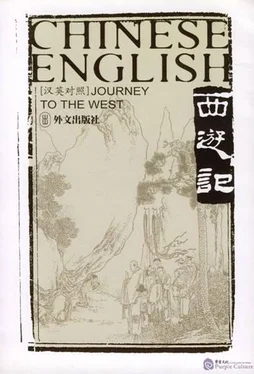“This had better not be a trick to soften me up and make me let you get away,” said Monkey. “If you really want to protect the Tang Priest and you aren't trying to kid me, then you'd better make a vow to Heaven, and I'll take you to meet my master.” The monster fell to his knees with a thud, and kowtowed to the sky so often that he looked like a rice pestle.
“Amitabha Buddha,” he cried out, “if I'm not completely sincere, cut me up into ten thousand bits for breaking the laws of Heaven.”
After hearing him swear this oath, Monkey said, “Very well then, now light a brand and burn this place of yours out. If you do that, I'll take you.” The monster piled up some reeds and brambles, lit a brand, and set the Cloud Pathway Cave on fire; it burned as well as a brick kiln that has got out of control. “I've no second thoughts,” he said, “so please take me to see him.”
“Give me that rake of yours,” Monkey ordered, and the monster obediently handed it over. Monkey then plucked out a hair, blew on it with magic breath, and shouted, “Change!” It turned into three lengths of hempen rope, with which he bound the monster's hands behind his back; the monster docilely put his hands there and let Monkey tie him up. Then Monkey seized him by the ear and led him off with the words, “Quick march.”
“Take it easy,” the monster pleaded. “You're pulling so hard you're hurting my ear.”
“Can't be done,” Monkey replied. “Can't show you any favours. As the old saying has it, 'even a good pig must be handled roughly.' Wait until you've seen my master. If you really are sincere, you'll be released then.” The two of them went back through cloud and mist to Gao Village, and there is a poem to prove it:
The Golden Vajra is stronger than Wood,
The Mind Ape could bring the Wooden Dragon to submission.
When Metal obeyed and Wood was tamed they were at one;
When Wood was loving and Metal kind they worked together.
One host and one guest with nothing to keep them apart,
With the three in harmony they had a mysterious power.
Nature and feelings both rejoiced as they joined in the Supreme Principle;
They both promised without reservation to go to the West.
In a moment they were back at the village. Holding the monster's rake in one hand and twisting his ear with the other, he said, “Do you know who that is sitting up straight in the main hall? It's my master.”
When Old Gao and all his friends and relations saw Monkey coming, tugging the bound monster by his ear, they all came into the courtyard and said happily, “Venerable sir, this is the son-in-law all right.” The monster went forward, fell to his knees, and kowtowed to Sanzang with his hands behind his back.
“Master,” he shouted, “Your disciple failed to welcome you. Had I known, master, that you were staying in my father-in-law's house, I'd have come to greet you and do homage, and I'd have been saved all this agony.”
“How did you make him submit and come to pay homage?” Sanzang asked Monkey.
Monkey then let the monster go, hit him with the handle of the rake, and yelled, “Tell him, fool.” The monster then told Sanzang all about how he had been converted by the Bodhisattva.
Sanzang was so pleased that he asked Squire Gao for an incense table to be brought, which was done at once. Sanzang then washed his hands, burnt incense, bowed low to the South, and said, “Thanks be to the Bodhisattva for her divine grace.” The elders also burnt incense and bowed low in worship. When this was done, Sanzang took the seat of honour in the hall and told Monkey to untie the monster. Monkey shook himself to take his hairs back, and the ropes untied themselves. The monster bowed to Sanzang once more and vowed to go to the West with him. Then he bowed to Monkey as his elder brother because he had joined first, addressing him as “elder brother” from then on. “If you wish to earn a good reward by going with me as my disciple, I'll give you a Buddhist name to call you by.”
“Master,” he replied, “When the Bodhisattva laid her hands upon my head and told me to obey the prohibitions, she gave me a Buddhist name-Zhu Wuneng, Pig Awakened to Power.”
“Wonderful, wonderful,” said Brother Monkey with a smile, “I'm called Wukong, Awakened to Emptiness, and you're called Awakened to Power. That makes us members of the same sect in the Buddhist faith.”
“Master,” said Pig, “I have been instructed by the Bodhisattva and I never eat the five stinking foods and the three forbidden meats-wild goose, dog, and snakehead. I've eaten vegetarian food in my father-in-law's house and never touched the stinking foods; but now that I have met you, master, I'm freed from these restrictions.”
“You are not,” Sanzang replied. “You are not to eat the five stinking foods and the three forbidden meats, and I'm giving you another name: Eight Prohibitions, or Bajie.”
“I shall obey my master's command,” the moron happily replied, and from then on he was known as Zhu Bajie, or Eight Prohibitions Pig.
Squire Gao was happier than ever to see that he had turned from evil to good, and he ordered his servants to set out banquet with which to thank the Tang Priest. Pig went over to Squire Gao, tugged at his coat, and said, “Sir, may my wife come out and pay her respects to these two gentlemen?”
“Brother,” said Monkey with a laugh. “You've entered the church now and become a monk. Don't ever talk about a wife again. Only Taoist priests can have families-we Buddhist monks never marry. Let's all sit down and eat a vegetarian meal, then we can set off early tomorrow morning on our journey to the West.” Squire Gao had the table and chairs set out and asked Sanzang take the seat of honour. Monkey and Pig sat on his left and right, and all the relations sat below them. Squire Gao opened a pot of wine, from which he filled a cup and poured a libation to Heaven and Earth before handing it to Sanzang.
“Frankly, sir,” Sanzang said, “I have been a vegetarian from the womb, and have not consumed strong-flavoured food since my earliest childhood.”
“Venerable master, I know that you are a vegetarian,” Squire Gao replied, “which is why I haven't pressed any meat or strong-flavoured food upon you. But this wine is made from vegetable matter, so a cup of it will do no harm.”
“I don't drink either,” Sanzang explained, “as alcohol is the first of the prohibitions of the priesthood.”
“Master,” pig hastily interjected, “I may be a vegetarian, but I haven't given up liquor.”
“And although I haven't strong head for the stuff and can't finish a whole jar of it, I haven't given it up either,” Monkey added.
“In that case you two had better drink some; but don't get drunk and ruin everything,” said Sanzang. The pair of them then took the first cup, after which everyone sat down again as the vegetarian dishes were brought in. Words could not describe the flowing cups, the well-filled dishes, and the splendid food.
When master and disciples had eaten, Squire Gao brought pieces of gold and silver to the weight of two hundred ounces on a red lacquer tray and offered them to the three pilgrims to help with the expenses of their journey. Then he produced three brocade-collared gowns that could serve as overcoats. “We are mendicant monks,” said Sanzang, “Who beg for our food in the villages and other places through which we pass, so we could not possibly accept gold, silver, or cloth.”
Monkey then marched up and grabbed a handful of the money. Then he addressed the young man Gao Cai. “Yesterday,” he said, “I troubled you to lead my master here, and today he has recruited another disciple, but we have been unable to show our gratitude. So take these pieces of gold and silver as your fee for guiding us, and buy yourself a pair of straw sandals. If you have any more evil spirits in future, and you help us again, we'll be able to show even more appreciation.” The young man Gao Cai took the gold and silver, then kowtowed to express his thanks.
Читать дальше









